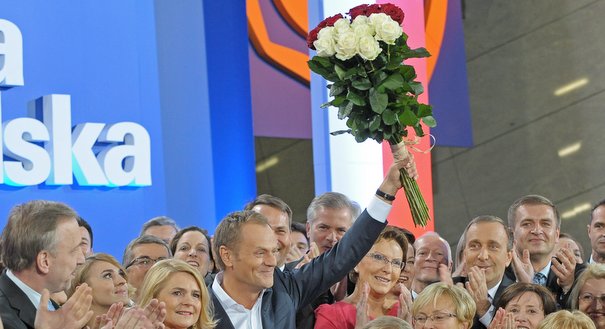According to unofficial results, Civic Platform led by incumbent Prime Minister Donald Tusk, with support of almost 39% of electorate, won the parliamentary elections that took place in Poland on October 9. The ruling party gained a 10% advantage over its main rival and the biggest opposition party, Law and Justice, which claimed slightly over 30% of the votes.
Consequently, Tusk is going to be the first prime minister since 1989 to hold this office for two consecutive terms—a phenomenon rather uncommon in this part of Europe in the post-communist period.
The new government is likely to maintain its foreign policy principles, widely seen both inside the country and among European partners as successful. According to polls conducted in 2011, Minister of Foreign Affairs Radek Sikorski is the most popular and highest valued minister in Tusk’s government. Thus, it is highly possible he will serve another term as the chief of Polish diplomacy.
During the election campaign, Civic Platform’s politicians, among the top-ranking successes of the government, mentioned the growing importance of the country in the European Union, better relations with the key player in EU—Germany, and a significant improvement of Polish-Russian relations.
Civic Platform has been rewarded for its performance at the EU level. Over the last four years, Poland—currently holding the Presidency of the Council of the European Union—has earned an image as a stable and predictable country. The Polish-Swedish initiative of Eastern Partnership—despite relatively low profile and unsure future—ranks among the most important achievements since Poland’s accession into the EU. Its significance may grow if the anticipated EU-Ukraine Association Agreement is signed.
Unlike his predecessors, who also declared their resolution to improve strained relations with Russia, Tusk has overseen a noticeable improvement in the Russian-Polish relationship, owing largely to the Kremlin’s reorientation. Numerous meetings at the highest level, including President Dmitry Medvedev’s visit to Warsaw, though not having brought much of substance, have helped to maintain a constructive dialogue. During the visit, both governments agreed to create centers for dialogue and cooperation, with aims to promote historical research and support youth exchanges. This was despite controversies in Poland over the investigation into the crash of the Polish plane with President Lech Kaczynski aboard in April 2010.
In contrast to previous years, Poland’s ideas on EU-Russia relations have been seriously taken into consideration in crucial European capitals. Obviously, differences between Warsaw and Berlin, or Paris in how they view the principles of the EU Eastern Policy have not disappeared, but recognition of Poland as a serious player can not be unnoticed. In particular, Radek Sikorski took part in a meeting with his German and Russian partners, which would have been rather unthinkable in the past. The will to maintain its position in the European mainstream, and thus acquire the ability to shape European policy toward Russia was demonstrated by the recent Polish initiative, proposed to the EU and Russia, to include the whole territory of the Kaliningrad region into visa-free regime.
In the domestic field, the Tusk government’s achievements are much more disputable. Although the financial crisis hasn’t affected the Polish economy so much, and during the last four years huge investments into the infrastructure have been made, the government has been accused of a lack of crucial financial reforms and an insufficient fight with public debt. For his inactivity on the economic front, Tusk has been attacked not only by the opposition parties, but also by liberal economists, among them, the influential former Finance Minister Leszek Balcerowicz.
Tusk certainly should not rest on his laurels as his next government will have to face the consequences of the financial crisis in Europe. Although Poland is not a member of the eurozone, it is highly vulnerable with regard to the economic situation in Europe. Indeed, Polish exports, being of key importance for the country’s GDP growth, noticeably rely on the economic situation in Germany.
Poland is also going to fight a battle defending expenditures for a cohesive policy in the EU budget for the 2014-2020 period, as calls to slim down the European budget have been increasingly gaining ground. The recent letter signed by nine ministers of EU member states, including France, Germany, and Great Britain, shows that the negotiations on this matter are going to be fierce.
In conducting its foreign policy toward Russia, the “new old” government should aim to maintain mutually beneficial and friendly relations between the two countries, avoid any provocative movements, and actively participate in the formation of EU Eastern Policy. Additionally, one should not forget that it is largely up to Russia whether the recent rapprochement will last.
Andrzej Turkowski is a visiting researcher at the Carnegie Moscow Center.
